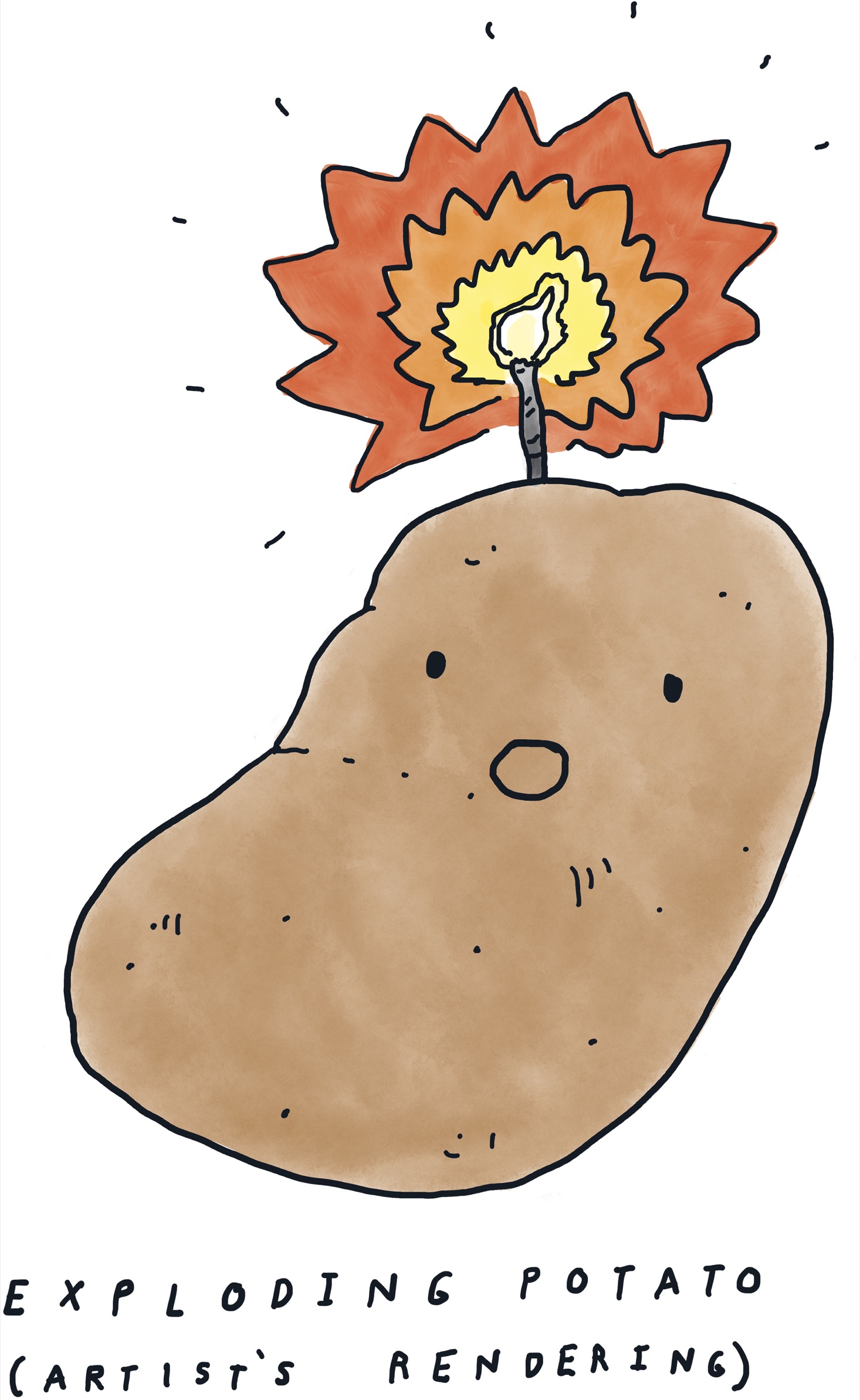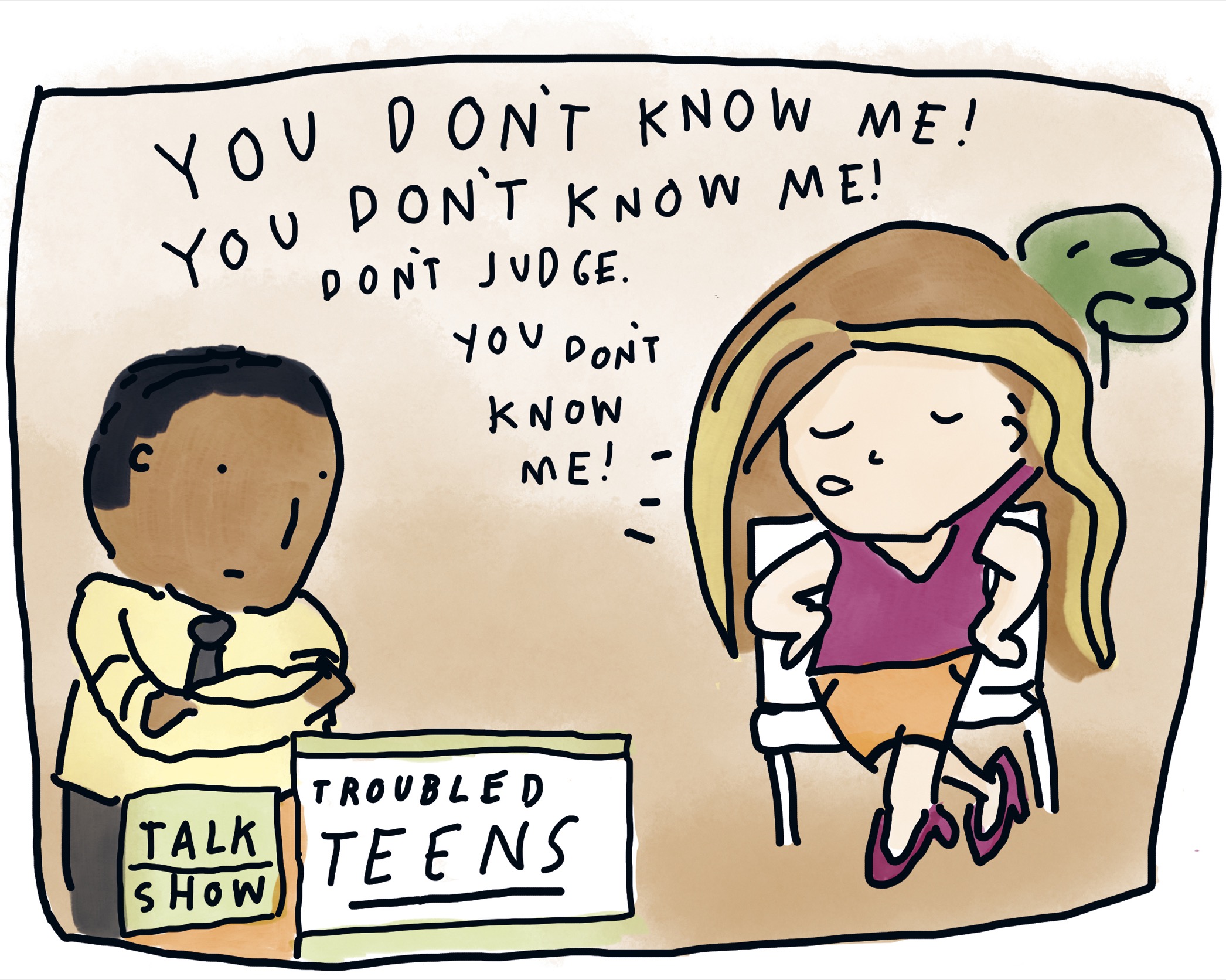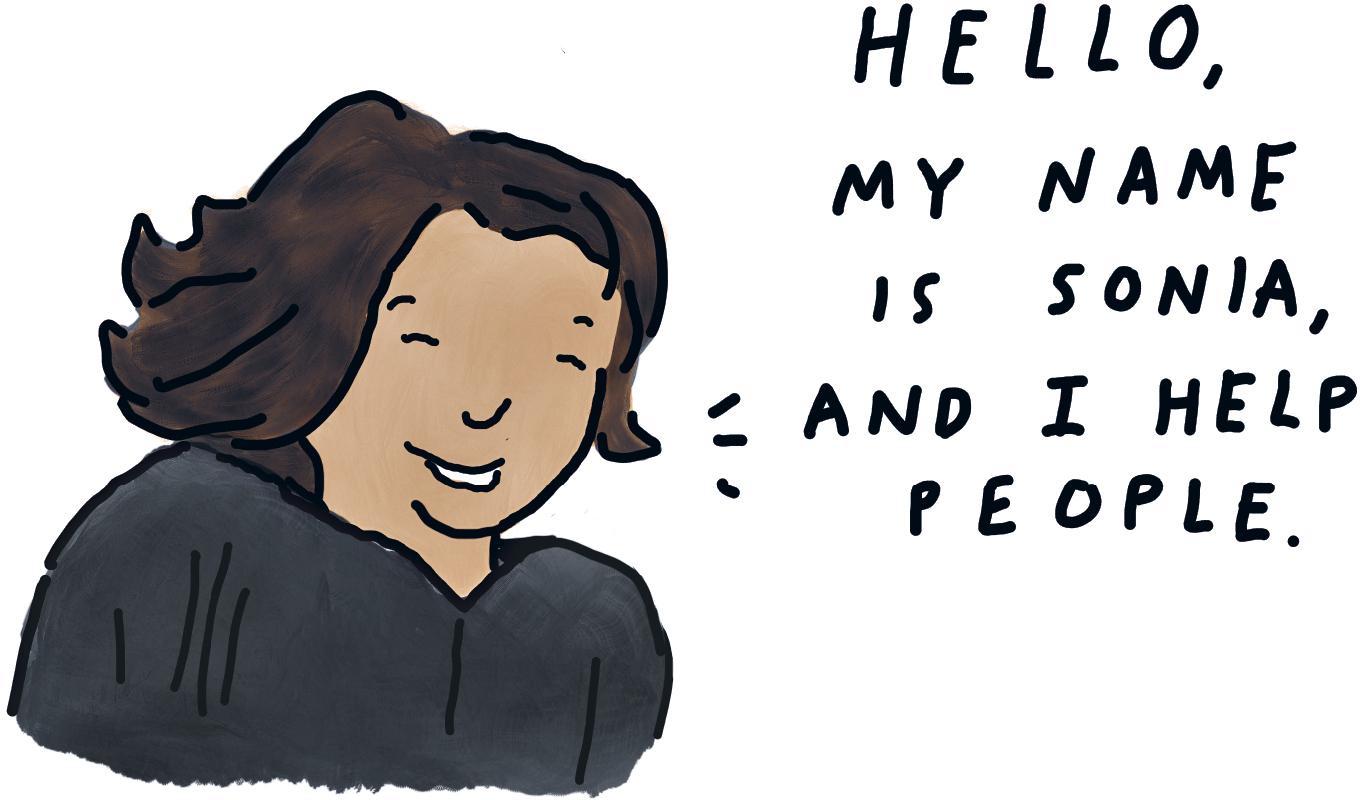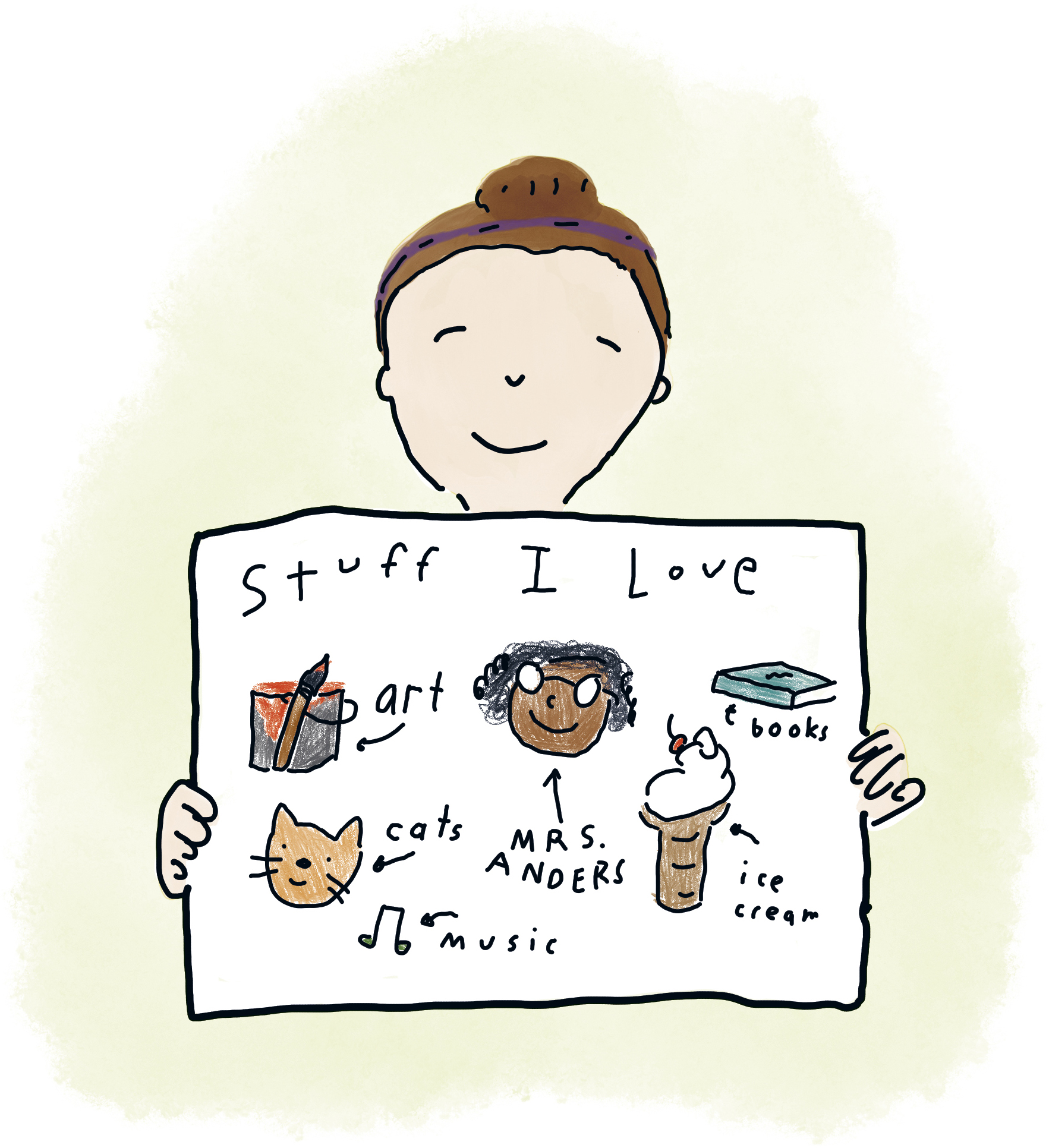The questions most grownups asked me when I was a child were “How old are you?” and “What grade are you in?” Kids do not ask questions like this. Smaller children might introduce themselves by declaring how old they are: “I’m three!” But this is usually just a starting place for the real things they want to talk about. From there, they typically begin to elaborate on favorite animals, cherished toys, or uncomfortable observations they’ve recently had about human anatomy.
The more time I spent with elementary school students, the more I wanted my interactions with all people to be like them. Those kids asked great questions. They were consistently present. They were supercurious. They weren’t interested in basic-introduction, résumé-type stuff. There was no concern for knowing my age or my job. Nope. With a freewheeling, childlike wonder, they would ask me if I had any pets. They’d ask if I’d read their favorite book. They wanted to know if I played video games. Once a student asked me if I’d ever seen a potato explode. I’d never been asked that in my life. They asked the kinds of things that led to far more interesting places than just sharing how many birthdays I’d had.

If only we adults were more childlike in our conversations. We tend to focus on things like what people do and where they live. We gather basic stats and then, generally, move along. Never do we get to the really good stuff, like “Have you ever seen a potato explode?” There is, however, one awesome grownup who showed me what a childlike curiosity and a thoughtful conversation could look like, and it came from a source that surprised me: a Supreme Court justice.
It all happened when my young brother-in-law and I were invited to a fancy dinner. This would require us to dress up. Not a big deal for Robby, as he could simply wear the suit he wore when filming Kid President. For myself, I’d have to make sure my suit still fit. Stress eating had complicated my wardrobe options. That wasn’t the only thing making me anxious. I’d grown to despise events like this because they felt like entering a grade-school lunchroom all over again. You try to walk with purpose while also not being exactly sure which direction you’re going. Your eyes scan the entire room, hoping to spot someone you know. Should you be unable to find someone you know, you take a risk and ask someone if you can sit with them. Having chosen your fate, you now have to try to not get any food on your nice clothes.
Then come the questions.
Just as grownups often have stock questions we ask of children (e.g., “How old are you?”), there are scripted questions we have reserved for fellow grownups. These are things like “How are you?” and “How about this weather?” These are harmless, friendly, introductory sorts of things. The question that strikes terror in my heart, though, is the perennial, “So, what do you do?”
I fantasize about just straight-up lying. I want to say, “My name is Chad and I am a . . . doctor.” Nobody would ask another question. Oh, we get it. You’re a doctor. I think about how impressed they’d all feel to be seated at a table with Dr. Chad. Then I’d undoubtedly begin to second-think my lie as I panicked at the thought of someone choking or falling ill. Someone across the room would loudly cry, “Is there a doctor in the house?!” Everyone at my table would point at me. “Him! He’s a doctor!” I’d then have to attempt following through with my ridiculous lie. As I bumbled through the charade, everyone would know me for the fraud I’d always been.

It can be hard to put into words what you do. When someone asks me, I usually tell them some combo of writer, director, and storyteller. Yet I always feel the need to include supplemental information. Who I am and what I do can’t exactly be put easily into a neat box. Nobody can. I share what I do for work, but then begin attempting to explain away who I actually am. I slowly turn into one of those troubled teens on a daytime talk show, snapping my fingers back and forth and shouting, “You don’t know me! You don’t know me!”

Maybe you’ve also had the feeling that people assumed they knew who you are based on limited information? You’re at a dinner. All is going well. The food is wonderful. The setting is perfect. The company is superb, but then it happens. The question is asked. It’s not meant to completely derail the evening, but it does because they ask:
“So, what do you do?”
There I was at this fancy dinner. We had been invited to the Jefferson Awards in Washington, D.C. Founded in 1972 by Jacqueline Kennedy Onassis, Senator Robert Taft, and Mr. Sam Beard, the awards were created to celebrate service. So, needless to say, it was an honor to be invited and have our work recognized. It was also a little out of my element and that of my young brother-in-law. Decorative nameplates were set out on each table around the room.
We found our spots by seeing our names on the place cards. I was relieved by the assigned seating. I casually wondered who they’d placed next to me. That’s when I looked to discover that the person seated beside me would be none other than Justice Sonia Sotomayor of the U.S. Supreme Court.
Supreme Court justice. She is a SUPREME. COURT. JUSTICE. “So, what do you do, Supreme Court justice Sonia Sotomayor?” I’m not going to ask that. I know what she does! She does really important work . . . Supreme Court justice-ing. Come to think of it, me referring to her work as Supreme Court justice-ing is precisely the reason why I should not be allowed to sit next to her, much less speak around her.

My mind began to play out different scenarios. I again explored possibly just telling her I was a doctor, but my better judgment prevailed. Robby was playing with his napkin. I was pretending to be completely at home at the table, though wondering how I’d ever be able to tell her I just make silly YouTube videos for a living. She was, after all, someone in the midst of making history. She was making a massive difference in the world. She had even appeared on an episode of Sesame Street, which I’d seen with my kids—several times—and could reenact word for word.
The anticipation grew and then our tablemates all arrived. Justice Sotomayor greeted us and was, as I expected, absolutely estimable. Robby and I both successfully made it through the meal without any incidents involving food. I cautiously tried to steer any and all conversation away from interest in me or what I “do.” But then—like during all other dinners or interactions with grownup people—it happened. The question. Except this time, there was a twist.
Supreme Court justice Sonia Sotomayor spoke in my direction. “So, Brad . . .”
I could feel the question coming. I could feel my shoulders tightening. Please ask me to pass the salt, I thought. Please ask me to pass the salt.
She was leaning toward me with great interest. “Tell me . . .”
Here it comes. I continued to roll around in my head. Salt. Salt. Salt. Just ask me to pass the salt . . .
“What do you love about what you do?”
Silence. What do I love about what I do? Did I hear that correctly? Love? Now this I could answer. This unlocked in me a fury of words. I love getting to work with young people. I love getting to make things that I needed when I was a kid. I love getting to simply create. I love. I love. I love. The words spilled out of me.

What do you love about what you do? Throughout the night, I heard her ask this same question of many other people. She didn’t do so in a scripted or robotic way. This was an intentional, thoughtful question from an intentional, thoughtful person. I’m sure of it, because I saw her soulfully take in each answer with genuine inquisitiveness.
She even asked Robby the question. Sometimes people would speak to him as if he were more like an internet meme or some magical unicorn boy from space and not an actual person. Not her. She had no reference for the videos we made beyond what we had shared with her. She asked him, “So, Robby, what do you love about being Kid President?” I sat on edge awaiting his response. As with most young kids, there was truly no guessing what he’d say, ever. In interviews I would always be a bundle of nerves because I would never know where he might take things. At the time, it was something that distressed me. Now it’s really one of my absolute favorite things about him.
Robby’s response floored me. He looked at her and, after taking a moment to think, said, “I love getting to help people. I love getting to do things like this, but mostly . . .”
Oh no, I thought. Where is he going with this?
“. . . I just like doing things with Brad.”
There it was. She had invited him to put words to something I didn’t know I needed to hear. Here was why he loved doing what we’d been doing. Here was why I loved what we’d been doing. We loved helping people and just being together. Plus, he said he just liked being with me. Just me, as I am.
I think I knew, deep down, that those were going to be his answers. I’d just never heard him articulate them. I wondered, also, if he’d even heard me put words to what I love about what we’d been doing together. When you get busy, you tend to just complain or assume everyone knows what you love. Somehow the most important thing about what we do and why we do it—the love—had become something we didn’t speak of enough.
I remembered back to the days of lying on my office floor. The discouragements had piled up. The barrage of requests, critiques, and internet comments had caused me to lose sight of the very reasons I’d started making things in the first place. I’d forgotten what I loved about what I did, who I did it with, and why.
As the evening ended and we were saying our goodbyes, I was able to find Justice Sotomayor and thank her. I admitted feeling nervous about being seated next to her. She laughed, and I was relieved. It was encouraging also when she expressed feeling nervous about fancy dinners as well. In that moment, we were . . . just humans. Connecting and laughing as real people. Since it was doubtful we’d find ourselves together ever again, I knew I had to ask it. My time asking questions of kids had been making me a better question-asker all around. So, I tried out my new skills on her:
“So, I have a question. You asked me and many others what we love about what we do. Where did that come from?”

She smiled and said, “Well, when you know what somebody loves, you know who they really are.”
She continued, “If I ask somebody what they do, then they’ll give me a noun. People aren’t really nouns, though. I want to get to know who a person really is. So, to do that, you have to get to the love.”
We then talked about how she responds to the question “So, what do you do?” This was funny to me, because I assumed most people would know. However, she said a lot of people actually don’t recognize her and casually ask what she does for a living. Interestingly, she said she doesn’t leap to say, “Oh, I’m a Supreme Court justice!” Which, part of me feels like I would. I’d likely get T-shirts printed and vanity license plates for my car that all made certain to announce my role as someone who officially has a job for life.

When people ask her what she does, her response is not to give her title. Her response is not about her rank. Her response is who she really is, which is to say, it is what she loves. She said she tells people, “Hello, my name is Sonia, and I help people. I try to give voice to people in need. Now, how can I help you?”
It turns out that kids are like Supreme Court justices. They’re looking for what you love. They’re hoping there’s some crossover between what they love and what you love. They’re wanting to connect. Really, it’s true of kids and all of us former kids. We’re all just children on a playground wanting desperately to be loved and to tell one another about that love.
In classrooms I found that students would clam up when I asked for statistical information. Age? Grade? Siblings? But when I began asking questions like a child—or like Sonia Sotomayor—they would light up. I’d sometimes present them with a blank sheet of paper and ask them to fill it with all the things they love. They’d go on and on drawing animals and soccer balls and favorite books. They’d draw people they loved and write out the names of family, friends, teachers, and celebrities. By the time the activity ended, many would still be attempting to find room to place at least one more loved thing on their sheet. When the students held them up, I looked at those once blank, lifeless sheets of paper now brightly covered in love and I’d know so much more about who’d filled them than I did before.
My conversation with Justice Sotomayor shifted how I think about what I do for a living. She dismantled how I see my own identity. Now, instead of obsessing over how my work defines me, I’m constantly making an inventory of what I love. Instead of worrying about how others will see me, I’m trying to think of ways I can make sure they feel seen. It’s a process of trying to operate out of love and not out of a desire to be loved.

It is her wisdom that inspired me to try to change how I think of myself, introduce myself, and get to know others. Every day has become a quest to focus on what I love about what I do. On difficult days, there can be nothing better for me or for you than to stop to take stock of those things that make us who we are—those things that we love.
You and I are more than our names. We are more than our professions. We are a glorious mishmash of decisions and indecisions. We are a collection of loves and longings. Khalil Gibran said, “Work is love made visible.” As someone trying to be a better grownup, I want that to be true of me. I want the things I’m doing to reflect who I really am and all that I really love.
So the next time I visited a classroom after this revelation, I began with:
“Hello! My name is Brad and I love to help people. I love telling and hearing stories from kids and former kids. What do you love about being in this class?”